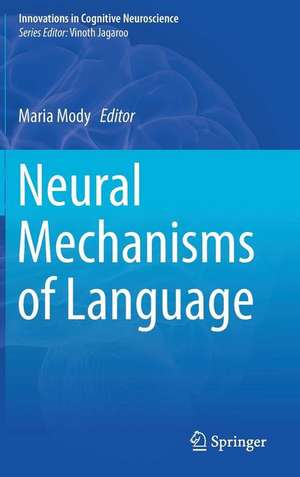Neural Mechanisms of Language: Innovations in Cognitive Neuroscience
Editat de Maria Modyen Limba Engleză Hardback – 26 oct 2017
Included in the topics:
· The interaction between storage and computation in morphosyntactic processing.
· The role of language in structure-dependent cognition.
· Multisensory integration in speech processing: neural mechanisms of cross-modal after-effect.
· A neurocognitive view of the bilingual brain.
· Causal modeling: methods and their application to speech and language. · A word in the hand: the gestural origins of language.
Neural Mechanisms of Language presents a sophisticated mix of detail and creative approaches to understanding brain structure and function, giving neuropsychologists, cognitive neuroscientists, developmental psychologists, cognitive psychologists, and speech/language pathologists new windows onto the research shaping their respective fields.
| Toate formatele și edițiile | Preț | Express |
|---|---|---|
| Paperback (1) | 582.16 lei 38-45 zile | |
| Springer Us – 23 iun 2018 | 582.16 lei 38-45 zile | |
| Hardback (1) | 700.10 lei 6-8 săpt. | |
| Springer Us – 26 oct 2017 | 700.10 lei 6-8 săpt. |
Preț: 700.10 lei
Preț vechi: 823.64 lei
-15% Nou
Puncte Express: 1050
Preț estimativ în valută:
133.96€ • 139.87$ • 110.87£
133.96€ • 139.87$ • 110.87£
Carte tipărită la comandă
Livrare economică 04-18 aprilie
Preluare comenzi: 021 569.72.76
Specificații
ISBN-13: 9781493973231
ISBN-10: 1493973231
Pagini: 226
Ilustrații: X, 226 p. 44 illus., 27 illus. in color.
Dimensiuni: 155 x 235 x 22 mm
Greutate: 0.51 kg
Ediția:1st ed. 2017
Editura: Springer Us
Colecția Springer
Seria Innovations in Cognitive Neuroscience
Locul publicării:New York, NY, United States
ISBN-10: 1493973231
Pagini: 226
Ilustrații: X, 226 p. 44 illus., 27 illus. in color.
Dimensiuni: 155 x 235 x 22 mm
Greutate: 0.51 kg
Ediția:1st ed. 2017
Editura: Springer Us
Colecția Springer
Seria Innovations in Cognitive Neuroscience
Locul publicării:New York, NY, United States
Cuprins
1.Language: concepts, models and systems.- 2.Functional neuroanatomy of speech.- 3.Neurocognitive architecture: phonology and phonetics.- 4.Neurocognitive architecture: semantics.- 5.Neurocognitive architecture: morphology and syntax.- 6.Cortical dynamics of language: parsing out the roles of Broca’s and Wernicke’s areas.- 7.Subcortical processes in speech and language.- 8.The bilingual brain.- 9.Sign language, gestures and the brain: An evolutionary basis for language.- 10.Multisensory integration in speech and language: interactions between neural systems.- 11.An informatics approach to the study of language.
Notă biografică
Maria Mody, Ph.D. is an assistant professor of radiology at Harvard Medical School and Principal Investigator of the Developmental Language and Reading Research Laboratory in the Athinoula A. Martinos Center for Biomedical Imaging at Massachusetts General Hospital, Boston. Her research focuses on the neural bases of impaired speech, language and reading in children with developmental disorders including autism and dyslexia. Using MEG, fMRI, and DTI, her lab investigates speech perception and speech production and the impact of impairment in these processes on spoken and written language as evident in brain circuits. Dr. Mody has authored or co-authored numerous research articles and is co-editor of Brain, Behavior, and Learning in Language and Reading Disorders (Guilford, 2008).
Textul de pe ultima copertă
This important volume brings together significant findings on the neural bases of spoken language –its processing, use, and organization, including its phylogenetic roots. Employing a potent mix of conceptual and neuroimaging-based approaches, contributors delve deeply into specialized structures of the speech system, locating sensory and cognitive mechanisms involved in listening and comprehension, grasping meanings and storing memories. The novel perspectives revise familiar models by tracing linguistic interactions within and between neural systems, homing in on the brain’s semantic network, exploring the neuroscience behind bilingualism and multilingual fluency, and even making a compelling case for a more nuanced participation of the motor system in speech. From these advances, readers have a more three-dimensional picture of the brain—its functional epicenters, its connections, and the whole—as the seat of language in both wellness and disorders.
Included in the topics:
· The interaction between storage and computation in morphosyntactic processing.
· The role of language in structure-dependent cognition.
· Multisensory integration in speech processing: neural mechanisms of cross-modal after-effect.
· A neurocognitive view of the bilingual brain.
· Causal modeling: methods and their application to speech and language. · A word in the hand: the gestural origins of language.
Neural Mechanisms of Language presents a sophisticated mix of detail and creative approaches to understanding brain structure and function, giving neuropsychologists, cognitive neuroscientists, developmental psychologists, cognitive psychologists, and speech/language pathologists new windows onto the research shaping their respective fields.
Included in the topics:
· The interaction between storage and computation in morphosyntactic processing.
· The role of language in structure-dependent cognition.
· Multisensory integration in speech processing: neural mechanisms of cross-modal after-effect.
· A neurocognitive view of the bilingual brain.
· Causal modeling: methods and their application to speech and language. · A word in the hand: the gestural origins of language.
Neural Mechanisms of Language presents a sophisticated mix of detail and creative approaches to understanding brain structure and function, giving neuropsychologists, cognitive neuroscientists, developmental psychologists, cognitive psychologists, and speech/language pathologists new windows onto the research shaping their respective fields.
Caracteristici
An in-depth comprehensive treatment of the cognitive organization and functional neuroanatomy of language Addresses spoken, written, and gestural aspects of language Rich tapestry of thought-provoking perspectives regarding basic assumptions about evolution of language and its neural implementation Cutting-edge neuroimaging research from some of the world’s leading laboratories using EEG, MEG, fMRI, and DTI


